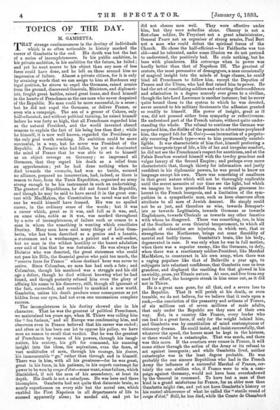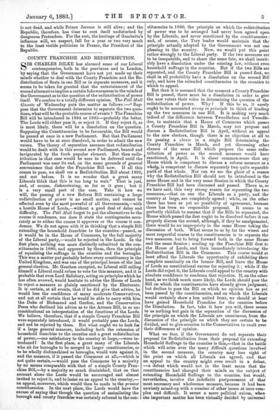TOPICS OF THE DAY.
M. GAMBETTA.
THAT strange continuousness in the destiny of individuals which is so often noticeable in history marked the career of Gambetta to the end. His death was but the last of a series of incompletenesses. In his public ambition, in his private ambition, in his ambition for the future, he failed ; and yet he went nearer to his object than any man of less force could have done, and he left on those around him no impression of failure. Almost a private citizen, for it is only by straining words that we can assign to him at Bordeaux any legal position, he strove to expel the Germans, raised armies from the ground, discovered Generals, Ministers, and diplomat- ists, fought great battles, raised great loans, and fixed himself in the hearts of Frenchmen as the one man who never despaired of the Republic. No man could be more successful, in a sense ; but he did not expel the Germans, or deliver France, or even win a campaign. The son of a grocer of Cahors, only half-educated, and without political training, he raised himself before he was forty so high, that all Frenchmen regarded him as the natural President, and the world invented absurd reasons to explain the fact of his being less than first ; while he himself, it is now well known, regarded the Presidency as the only goal worth reaching. No ambition could be more successful, in a way, but he never was President of the Republic. A Premier who had fallen, he yet so dominated the mind of France that be was able to set to himself as an object revenge on Germany ; so impressed all Germans, that they regard his death as a relief from an apprehension ; yet he had done nothing when he died towards the revanche, had won no battle, secured no alliance, prepared no insurrection, had, indeed, as there is reason to fear, from the Tunis Expedition, organised no army strong enough to be his instrument in such an undertaking. The greatest of Republicans, he did not found the Republic, and though he may be said to have saved it in the great con- test with MacMahon, the Constitution he saved was not the one he would himself have framed. His was no spoiled career, in the ordinary sense of the words ; but it was a career which, great as it was, and full as it was, and, on some sides, noble as it was, was marked throughout by a note of incompleteness, of failure such as comes to a man in whom the something is wanting which conciliates Destiny. Many men have said many things of Leon Gam- .betta, who has been described as a genius and a lunatic, a statesman and a wordmonger, a patriot and a self-seeker, but no man in the wildest hostility or the basest adulation ever said of him that he was fortunate. He was always the Dictator who was deserted, the great statesman who could not pass his Bills, the financial genius who paid too much, the "reserve force for France" whose destined hour was never to arrive. Since Columbus, no man has had such a fate ; and Columbus, though his manhood was a struggle and his old age a defeat, though he died without knowing what he had found, and though posterity refused him even the glory of affixing his name to his discovery, still, though all ignorant of the fact, succeeded, and revealed to mankind a new world. Gambetta, unless his death produce some consequence as yet hidden from our eyes, had not even one unconscious complete
SWUM
The incompleteness in his destiny showed also in his character. That he was the greatest of political Frenchmen, we maintained ten years ago, when M. Thiers was calling him the " fon furieux," and all Europe was condemning him, and observers even in France believed that his career was ended ; and often as it has been our lot to oppose his policy, we have seen no reason to recall that verdict. But he was the greatest of Frenchmen by reason of his powers, through his imagi- nation, his oratory, his gift for command, his amazing insight into the ideas, the aspirations, even the fears, of vast multitudes of men, through his courage, his finesse, his immeasurable "go," rather than through and in himself. There was in him, with all his greatness—for he was great, great in his force, in his patience, in his superb contempt for power to be won by coups d'Itat—some want, some failure, which diminished, if not the area of his ascendancy, at least its depth. His death is not a cataclysm. He was here and there incomplete. Gambetta had not quite that daimonic brain, so nearly superhuman on every side but the moral one which
enabled the First Napoleon in all departments of life to succeed apparently alone; he needed aid, and yet he did not choose men well. They were effective under
him, but they were nobodies alone. Chanzy is not a first-class soldier, De Freycinet not a great administrator, General Faure not an organiser of strong armies, Paul Bert not a man who could defeat the spiritual forces of the Church. He chose the half-efficient—for Faidherbe was too old—and he tolerated, under some illusion we do not pretend. to understand, the positively bad. He stole nothing, but he bore with plunderers. His entourage when in power was hardly better than that of Napoleon III. The greatest of orators, the most persuasive of demagogues, a man occasionally of magical insight into the minds of huge classes, he could bind all Frenchmen to follow him, except the Deputies of France and the Ultras, who had first raised him to power. He had the art of conciliating soldiers and extorting theirconfidence and admiration in a degree scarcely ever given to a civilian, though the late Lord Lawrence is another instance; but he never quite bound them to the system to which he was devoted, never secured to his military lieutenants the adhesion granted so readily to himself. His power of insight, great as it was, did not proceed either from sympathy or reflectiveness. He understood part of the French nature, without quite under- standing the whole. The refusal to continue the German war surprised him, the dislike of the peasants to adventure perplexed him, the regard felt for M. Grevy—an incarnation of a perpetu- ally recurring French type—was to him permanently unintel- ligible. It was characteristic of him that, himself preferring a rather bourgeois type of life, a life of lax and irregular comfort, he did not see the Frenchman's respect for asceticism, and at the Palais Bourbon wearied himself with the tawdry grandeur and vulgar luxury of the Second Empire ; and perhaps even more characteristic that, though thirsty for information and justly- confident in his diplomatic powers, he was proud to know no language except his own. There was something of smallness in that great nature which will not be thoroughly explicable until the secret memoirs of our time see the light, but which we imagine to have proceeded from a certain grossness in- herent in the French bourgeois, and a limitation of the sym- pathies in a sympathetic man, such as keen observers often attribute to all men of Jewish descent. He simply could not be as just, and therefore as wise, towards Bonapart- ists as towards Legitimists, towards Germans as towards Englishmen, towards Clericals as towards any other fanatics with whom he disagreed. There was something, too, in him. of the Southern or even Oriental temperament, to which all periods of relaxation are injurious, in which rest, that so strengthens the Northerner, brings out some flaccidity of mental and bodily tissue. Gambetta's brain, like his body,. degenerated in ease. It was only when he was in full motion, when there was a superior enemy, like the Germans, to defy, when there was a reactionary soldier-President, like Marshal MacMahon, to counteract in his own army, when there was a raging populace like that of Belleville a year ago, to subjugate into reluctant confidence, that Gambetta rose to true grandeur, and displayed the smelting fire that glowed in his unwieldy, gross, yet Titanic nature. At ease, and free from any need for effort, the bourgeois streak in him came out, as it did. not in Thiers.
He is a great man gone, for all that, and a severe loss to the Republic. That it will perish at his death, or even tremble, we do not believe, for we believe that it rests upon a rock,—the conviction of the peasantry and artisans of France, of six millions out of seven millions of male adults, that only under the Republic are they sure of their own way. But, in a country like France, every leader who can lead is a great force, if only for the weight behind him, and Gambetta was by constitution of mind contemptuous of visionary dreams. He could insist, and insist successfully, that whatever the speed, the horses must be kept in the harness, or there would be a catastrophe. That was much, and there was this more. If the overturn ever comes in France, it will come either through the action of the Army or its refusal to act against insurgents; and while Gambetta lived, neither catastrophe was in the least degree probable. He was probably the one sincere Republican who had in the French Army the influence of a successful Marshal of France, cer- tainly the one civilian who, if France were to win a cam- paign against Germany, would not have been overshadowed by the General in command. To have lost a man of that kind is a grand misfortune for France, for an abler man than Gambetta might rise, and yet not have Gambetta's history or his rooted abhorrence of what he called the "sterile round of coups (Mat." Still, he has died, while the Comte de Chambord
is not dead, and while Prince Jerome is still alive ; and the Republic, therefore, has time to root itself undisturbed by dangerous Pretenders. For the rest, the heritage of Gambetta's influence will, we suspect, fall for a year or two very much to the least visible politician in France, the President of the Republic.















































 Previous page
Previous page